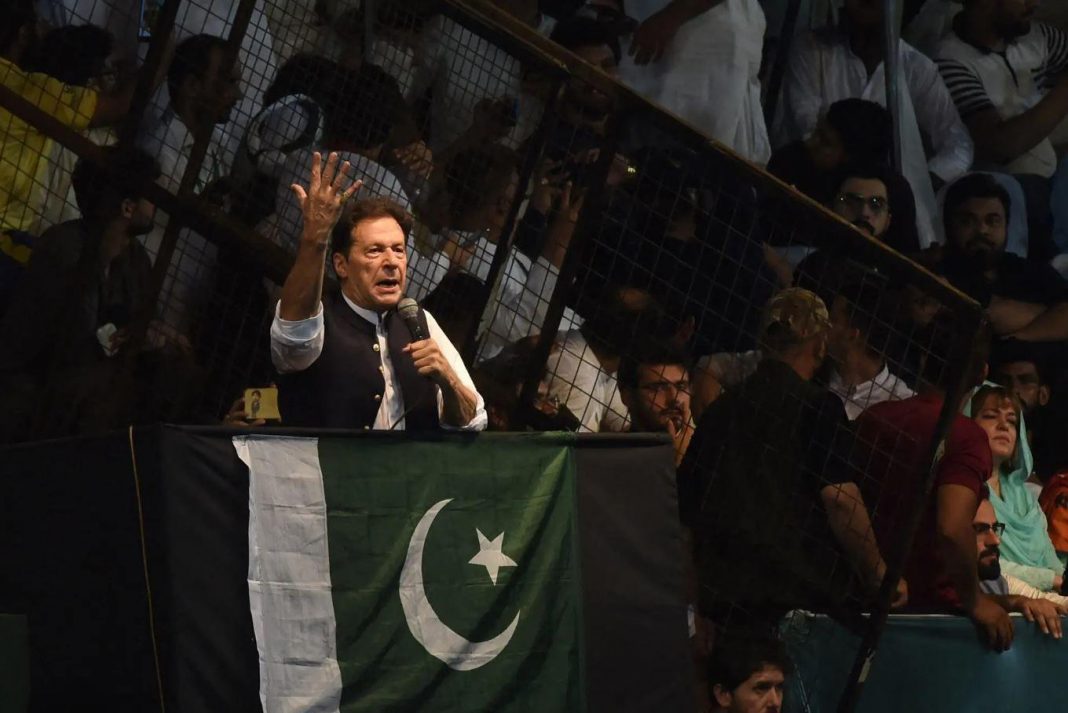Those who were close to the former Prime Minister Imran Khan have been taken into custody. There has been an attempt to intimidate or suppress media outlets and public personalities who are seen to be supportive to him. He is facing allegations brought against him under Pakistan’s antiterrorism legislation, and there is a possibility that he would be arrested.
A political fight between the governing elite and Mr. Khan, a former cricket star turned populist politician who was removed from his position as prime minister this year, has been raging in Pakistan for many weeks. A winner-take-all game in which the security forces and the justice system are wielded as weapons to sideline those who have fallen out of favour with the country’s powerful military establishment or political elite has been exposed as a result of the drama, which has shed light on the precarious state in which Pakistani politics currently finds itself.
Mr. Khan’s spectacular climb from the political periphery to the role of prime minister in 2018 served as a display for how cutthroat Pakistan’s politics had become: Criminal charges, threats, and intimidation from security personnel were used to eliminate his opponents from the electoral race. This allowed him to easily win the election. After he was elected, he and his allies continued to use the same techniques to threaten, intimidate, and silence political opponents and media who had previously opposed him.
The charismatic politician has been able to maintain himself and his party at the heart of Pakistani politics despite having a falling out with military officials and being dismissed from government earlier this year as a result of a vote of no confidence. It is a sign of his capacity to tap into the public’s deep-seated discontent with the political system and wield the type of populist influence that was formerly reserved for Pakistani religious leaders. It also shows that he is able to control the political situation in Pakistan.
This popularity has scared the current administration, which is headed by Shehbaz Sharif, as well as the military establishment. They have begun eliminating his followers one by one, and they have now turned the court system against Mr. Khan himself. However, the tried and true plan doesn’t appear to be doing anything to keep him in line, at least not so far, and some observers are concerned that the confrontation may become violent.
Political instability and military takeovers have been a constant problem for the nuclear-armed country of Pakistan ever since it was established 75 years ago. Even in the most tranquil of eras, the country’s military establishment has been the unseen hand steering electoral politics, putting its supporters into positions of power and driving away adversaries. This has been the case even in the most tranquil of times.
The last prime minister to be forced out of office before Mr. Khan was Nawaz Sharif, who is the elder brother of the current prime minister. In 2017, the Supreme Court issued a controversial ruling that disqualified Nawaz Sharif from holding office due to claims of corruption against him. The senior Sharif fled to London, essentially following in the footsteps of a long line of prominent leaders who have fled Pakistan in order to avoid the possibility of facing criminal prosecution there.
After giving a speech to thousands of supporters in the capital city of Islamabad on Sunday, Mr. Khan was charged under Pakistan’s antiterrorism act. In the speech, he threatened legal action against senior police officers and a judge who were involved in the recent arrest of one of his top aides. In an echo of that political script, Mr. Khan was charged under Pakistan’s antiterrorism act.
In the most recent several months, Mr. Khan has consistently pulled tens of thousands of followers into the streets, where he has lashed out against the existing administration as well as the military. His prospects for a political return have been bolstered by the enormous support of the people, and he has sought fresh elections while refusing to engage in political discourse with his opponents.
The assault on Mr. Khan and his followers has heightened the anger of young Pakistanis who are knowledgeable in social media as well as Pakistanis of an older age over the deeply ingrained corruption and the all-powerful influence that the military plays in the political structure of the nation.
Jamshed Awan was sitting on his rickshaw close by in the midst of a bustling market in the middle of Karachi as the passing traffic jostled him. According to Mr. Awan, he, along with many of his other friends and neighbours, has become more dissatisfied with the political climate in the nation.
Over the course of the previous two months, Mr. Khan has been successful in parlaying the tremendous support he has garnered into political success. His party, Pakistan Tehreek-e-Insaf, was victorious in municipal elections in the province of Punjab, which has often been used as a bellwether for national politics, as well as in the port city of Karachi. Both of these wins were decisive.
In spite of the fact that top government ministers and Islamabad police officials have denied Mr. Khan’s assertion that Mr. Gill was subjected to torture and sexual assault while in jail, Mr. Khan maintains that Mr. Gill was. Police authorities in Islamabad reportedly conducted a search of Mr. Gill’s room at the parliamentary lodging late on Monday evening, sources said. This marked a new development in the case against Mr. Gill.
As the word of the allegations circulated on Sunday night, hundreds of Mr. Khan’s followers gathered outside his magnificent hillside mansion on the outskirts of Islamabad and threatened to fight if Mr. Khan was arrested. Mr. Khan’s supporters have previously warned that Mr. Khan’s arrest would represent a “red line.”

